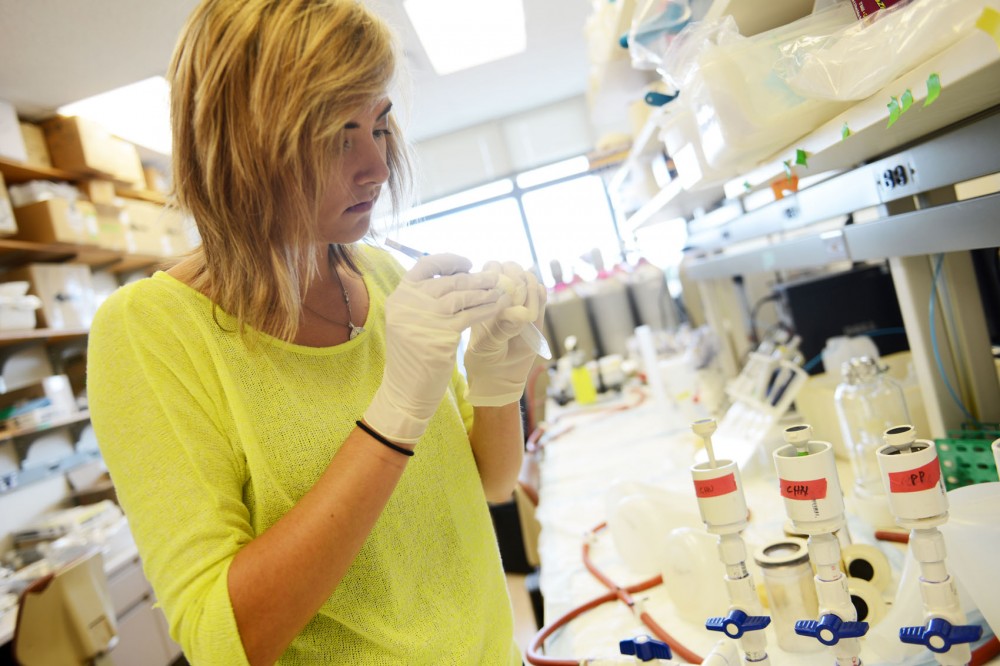This summer, University of Minnesota student Brittany Egeland cared for otters at the Minnesota Zoo and researched sharks in the Bahamas.
Because the University doesn’t offer a marine biology major, the biology, society and environment junior had always planned to use field studies, research and internships to gain experience. Now, a new marine biology minor includes those elements as requirements.
The 15-credit minor was created based on student demand and feedback from the College of Biological Sciences and the College of Food, Agricultural and Natural Resource Sciences.
Today, the University is one of the few Midwest schools that offer a marine biology program.
Peter Sorensen, fisheries, wildlife and conservation biology professor, has taught a shark ecology field course in the Bahamas for the past six years. During the course, he said, students have approached him asking where they could take more classes.
“I just saw a consistent interest,” he said. “I just thought … people want to pursue it — tentatively, at least look at it as a career — so why not develop it a little bit more?”
Egeland said she signed up right away when she learned about the marine biology minor.
“I was really excited,” she said. “Finally, I could have something official on my resume and transcript.”
Only five classes are required to complete the minor, but students must also have one credit of field, research or internship experience.
Fieldwork helped Egeland use what she’s learned about marine biology, but she said her classes have taught her animal classification and have given her a broader understanding of how the ocean works.
“In the field, I like it because it’s hands-on,” she said. “I can find, touch and hold what I’ve been learning about.”
Biomedical engineering junior Luke Parker said Sorensen’s shark ecology course was the “most amazing experience” of his life.
“We would go out every day and swim with sharks three or four times a day and take samples from the ocean,” he said.
Parker said he wants to combine medical engineering with marine biology, possibly working with sharks to research cancer.
“It’s something I really want to do,” he said. “They don’t offer the major here, and the minor is the next best thing. It’s my passion.”
But the minor isn’t limited to science students — anyone can declare it as long as they meet the general requirements. The program offers courses taught by faculty members from CFANS, CBS and the College of Science and Engineering.
Sehoya Cotner, associate professor and main adviser for the minor, has been crafting the program’s required courses and said she welcomes faculty involvement so the program can appeal to a diverse group of students.
Currently, students in the minor can study anywhere from the Galapagos Islands to the Mall of America aquarium. Cotner said they’re still exploring more field opportunities, both on the mainland and in coastal regions.
She said she’s tried to provide plenty of opportunities for students to gain field and research experience in different — and less expensive — ways.
“I don’t think you have to get drenched in saltwater to have a legitimate research experience,” Cotner said.
The nine-day shark ecology course this summer, for instance, cost about $3,500.
Fisheries and wildlife junior Erika Senyk is currently working in an ecology lab analyzing algae, water samples and chlorophyll.
“I think that’s a good place to start because there aren’t very many marine biology labs [at the University] right now,” she said.
Senyk said she wants to use the minor to go into the field for ocean conservation.
“It’s all I want to do,” she said. “I’ve been waiting my whole college career for that minor.”
Last April, CBS Associate Dean Robin Wright asked CBS students in a survey if they’d want to declare a marine biology minor.
Of the college’s 632 students, about one-fifth said they would “definitely” declare the minor and nearly half said they were “very interested” in it.
Sophomore Peter Xiong said he wanted to major in marine biology but was disappointed last year to find out the University didn’t have a program.
“The minor kind of made up for that,” he said.
Wright said she had a group of students in a seminar plan requirements they would want for a marine biology minor.
“Our students came up with the same ideas that we agreed … were great ideas,” she said. “The more we can empower them and the more we can support them, the better they’ll be.”


